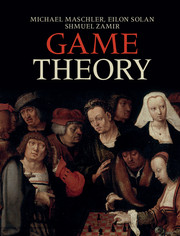Book contents
- Frontmatter
- Contents
- Acknowledgments
- Notations
- Introduction
- 1 The game of chess
- 2 Utility theory
- 3 Extensive-form games
- 4 Strategic-form games
- 5 Mixed strategies
- 6 Behavior strategies and Kuhn's Theorem
- 7 Equilibrium refinements
- 8 Correlated equilibria
- 9 Games with incomplete information and common priors
- 10 Games with incomplete information: the general model
- 11 The universal belief space
- 12 Auctions
- 13 Repeated games
- 14 Repeated games with vector payoffs
- 15 Bargaining games
- 16 Coalitional games with transferable utility
- 17 The core
- 18 The Shapley value
- 19 The bargaining set
- 20 The nucleolus
- 21 Social choice
- 22 Stable matching
- 23 Appendices
- References
- Index
21 - Social choice
- Frontmatter
- Contents
- Acknowledgments
- Notations
- Introduction
- 1 The game of chess
- 2 Utility theory
- 3 Extensive-form games
- 4 Strategic-form games
- 5 Mixed strategies
- 6 Behavior strategies and Kuhn's Theorem
- 7 Equilibrium refinements
- 8 Correlated equilibria
- 9 Games with incomplete information and common priors
- 10 Games with incomplete information: the general model
- 11 The universal belief space
- 12 Auctions
- 13 Repeated games
- 14 Repeated games with vector payoffs
- 15 Bargaining games
- 16 Coalitional games with transferable utility
- 17 The core
- 18 The Shapley value
- 19 The bargaining set
- 20 The nucleolus
- 21 Social choice
- 22 Stable matching
- 23 Appendices
- References
- Index
Summary
Chapter summary
In this chapter we present a model of social choice, which studies how a group of individuals makes a collective choice from among a set of alternatives. The model assumes that each individual in the group holds a preference relation over a given set of alternatives, and the problem is how to aggregate these preferences to one preference relation that is supposed to represent the preference of the group. A function that maps each vector of preference relations to a single preference relation is called a social welfare function. The main result on this topic is Arrow's Impossibility Theorem, which states that every social welfare function that satisfies two properties, unanimity and independence of irrelevant alternatives, is dictatorial.
This impossibility result is then extended to social choice functions. A social choice function assigns to every vector of preference relations of all individuals in the group a single alternative, interpreted as the alternative that is most preferred by the group.
A social choice function is said to be nonmanipulable if no individual can manipulate the group's choice and obtain a better outcome by reporting a preference relation that is different from his true preference relation. Using the impossibility result for social choice functions we prove the Gibbard–Satterthwaite Theorem, which states that any nonmanipulable social choice function that satisfies the property of unanimity is dictatorial.
- Type
- Chapter
- Information
- Game Theory , pp. 853 - 883Publisher: Cambridge University PressPrint publication year: 2013



